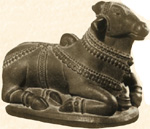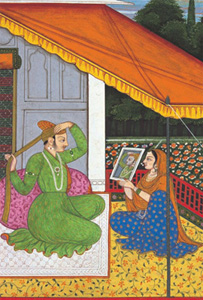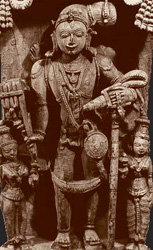Man about town

Nagarakavritta Prakarana

 aving thus acquired learning, a man, with the wealth that he may have gained by gift, conquest, purchase, deposit, or inheritance from his ancestors, should become a householder, and live the life of a citizen. He should reside in the vicinity of cultured men in a town, capital city, large village, or place selected for his livelihood. His house should be situated near a source of water, surrounded by a garden with bowers, and divided into different compartments for different purposes. There should be two residential apartments: an outer one and an inner one for privacy.
aving thus acquired learning, a man, with the wealth that he may have gained by gift, conquest, purchase, deposit, or inheritance from his ancestors, should become a householder, and live the life of a citizen. He should reside in the vicinity of cultured men in a town, capital city, large village, or place selected for his livelihood. His house should be situated near a source of water, surrounded by a garden with bowers, and divided into different compartments for different purposes. There should be two residential apartments: an outer one and an inner one for privacy.
His Residence
The inner apartment should be occupied by women. The outer one should contain a room, fragrant with rich perfumes; a bed with a soft mattress, low in the middle, and covered with a clean, white sheet; a canopy above and pillows at the head and foot. At the head should be a small niche with an image of the family deity; nearby a stool with jars for perfumed ointments, sweet smelling flowers and garlands; pots for collyrium and other fragrant substances, the bark of the common citron tree, and prepared betel nuts and leaves. Near the bed should be a couch; on the ground an engraved brass cuspidor; a lute hanging from a peg made from the tusk of an elephant; a board with paper for sketching and jars containing brushes and paints; a few books, and some garlands of the fragrant yellow amaranth flowers. On the ground near the couch should be a mattress of soft grass, and a gowtakiya, barrel-shaped pillow for reclining; a board with dice ought to be placed there too.

Outside this room, there should be bird cages; and separate rooms for study, hobbies, crafts, spinning and weaving. The garden should contain a swing protected by the shade of trees, and bowers of creepers laden with flowers with a raised parterre for sitting.
Daily Lifestyle
After waking up in the morning and performing the necessary ablutions, the householder should wash his teeth, apply a few ointments and perfumes, wear some ornaments, put collyrium on his eyelids and below his eyes, colour his lips with red lac, and eat betel leaves with other ingredients that provide fragrance to his breath.

Nandi, Lord Shiva's faithful and trustworthy bull companion.
He should bathe daily and clean his armpits; anoint his body with oil every other day; apply phenaka, or herbal soap powder every three days; have his head and face shaved every four days, and the other parts of his body every five or ten days. These practices should be carried out without fail. Meals should be taken in the forenoon, afternoon and at night, according to Charayana. After breakfast, he should spend some time teaching parrots and other birds to imitate human speech, and enjoy the fighting of cocks, quails and rams. Some time should be devoted to diversions with pithamardas, vitas and vidushakas; this should be followed by the midday siesta. After this the man about town, donning his clothes and ornaments, should visit his friends in the late afternoon and take part in intelligent amusements. In the evening entertainment should be provided in the form of singing, after which he and his friend should wait in his room, which has been previously decorated and perfumed, for the arrival of the woman who may be attached to him, or he may send a female messenger for her, or go and fetch her himself. On her arrival they should welcome her and entertain her with loving and pleasant conversation. Thus would the diversions of the day be concluded.

Shiva is mostly symbolized with four arms, with one upper arm holding the damru (a small hand drum) and the other a trident. He wears huge pendant earrings, his hair is matted and a snake coils around it.
In Honor of the Deity
Other diversions or amusements can also be occasionally pursued. On any auspicious day assigned to the deity, an assembly of citizens should be convened in the temple of Saraswati. There the skill of singers and other recent visitors in the town should be put to the test, and on the following day, they should be given some rewards. Then, depending on the appreciation of their performance by the assembly, they may either be retained or dismissed. The members of the assembly should always act in concert, both in times of distress and prosperity, and it is also their duty to extend hospitality to any strangers who may have come to the assembly. This should also apply to all the other festivals which may be held in honor of different deities, according to the established rules.

A charming vignette of the nayaka and nayika – miniature painting, mid-19th century, Pahari.
Social Activities
When men of the same age, disposition and talents, fond of the same diversions, and with the same degree of education, sit together with society women, or in an assembly of citizens, or at the abode of any one of them, and engage in agreeable discourse, this is called a sitting in company, or a social gathering. The subjects of discourse should comprise the completion of verses half composed by others, and testing each other's knowledge in the various arts. The most beautiful women, who may like the same things as the men, and who may have the power to attract the minds of others, should be paid appropriate homage.
Citizens should organize drinking parties. Society women should first offer liquors such as madhu, maireya, sura and asawa to the men, along with spicy fruit and vegetable delicacies containing salty, pungent, bitter and sour ingredients, and then eat and drink themselves.
In the morning, after dressing, men should ride out to gardens on horseback, accompanied by society women and followed by servants. They should enjoy the morning amidst pleasurable diversions, such as the fighting of quails, cocks and rams; gambling, and feasting their eyes on dramatics and other performances. Sated, they should return home in the afternoon, taking with them bunches of flowers as mementoes.

During the summer group-bathing can be enjoyed by sporting in the water in wells and tanks, purified with fragrant substances and free of dangerous aquatic creatures.

He organized receptions with music, dancing, singing and instruments. He was always elegantly dressed with jewels and offered drinking and amusements to the guests.
Celebrating Spring
Citizens should spend yaksharatri, the night of light, playing dice and gambling; taking leisurely strolls on moonlit nights, or indulging in outdoor sports; swinging, arranging parties and festivities appropriate to the days of spring and celebrating in honor of the God of Love. They should gather tender leaves and flowers to adorn themselves; sprinkle perfumed water and throw flowers of the kadamba tree on each other; mimic with dialogues and sound; and partake in other such sports and amusements which appeal at the time.
Pithamarda: Teaching the Arts
A pithamarda is an itinerant, alone in the world, and penniless. Skilled in certain arts, he makes his living amidst assemblies of interested people, and by teaching them to courtesans.
A woman learned in the sixty
four arts, can win her husband's
favor, even though he may have
several other wives besides her.
Similarly, a wife who is separated from her husband can support herself easily, by her knowledge of these arts. A man who is versed in these arts and is loquacious and gallant, very soon gains the hearts of women.
Vita: A Messenger
A vita is a married man with a wife, who once enjoyed life's pleasures but has now lost his wealth; he has the qualities of a nagaraka even if he is no longer one himself, and is honored in assemblies of citizens and the abodes of society women. He lives by liaising between nagarakas and courtesans.
Vidushaka: A Jester
A vidushaka, also called a vaihasika, is a jester who provokes laughter; he is trusted by all and is acquainted with some arts. He acts as an adviser, being employed after quarrels to bring about a reconciliation between citizens and society women. This category of advisers also includes wives of Brahmins living on alms.
Some shlokas on this subject state:
A citizen discoursing, neither entirely in the Sanskrit language, nor wholly in the dialect of the region, on various topics in society, obtains great respect. The wise should not resort to a society disliked by the public, or one not governed by any rules, and intent on the destruction of others. In fact a learned man living in a society which acts according to the wishes of the people, and which has pleasure as its only object, is highly respected in this world.

Vatsyayana's nayaka was one who belonged to the affluent cultured class.

As the beautiful heroine dresses up in private her maid assists her. In all probability it is the maid who has secretly acted as a messenger and has lead the hero to witness her bare charms.